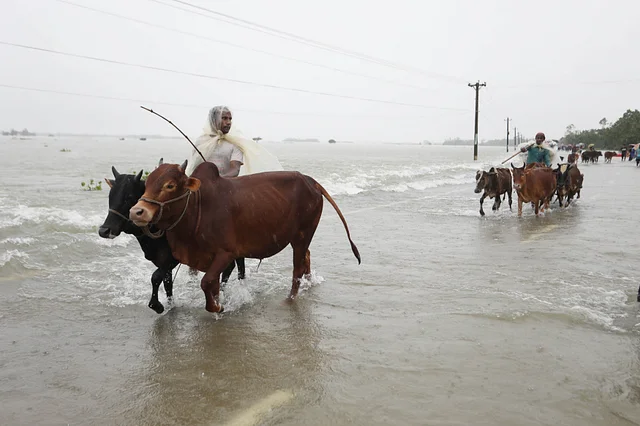The floods in Sylhet division have broken all previous records of the country. Upstream slopes of this section 80 percent of the area is now under water. Of this, 90 percent area of Sunamganj has been submerged. The water is now everywhere except for some high places, hilly areas and buildings in the remaining three district towns. The Flood Forecasting and Warning Center said the water level could rise further in the next two days.
The Center for Flood Forecasting and Warning says that in June 1997, there were many such floods in Sylhet division. But after that most of the floods were mainly confined to the lowlands of Haor and Sunamganj. In 2019, Sunamganj and Sylhet cities were suddenly flooded for two or three days. But most of the area of Sylhet division was not flooded.
80 percent of Sylhet area is under water
Arifuzzaman Bhuiyan, executive engineer of the Flood Forecasting and Warning Center, told Prothom Alo that floods in Bangladesh had never occurred before in a section of the country where about 80 per cent of the country was submerged. The previous floods in Sylhet were mainly confined to the haor area and its adjoining areas. But this time villages, towns and highlands have also gone under water. And this water is less likely to come down before Monday. Because, heavy rain is forecast for the next two days upstream.
According to the European Union’s satellite organization ECMW, Cherrapunji in India will receive 500 to 600 mm of rain upstream of Bangladesh tomorrow. Earlier in the last 24 hours there was 962 mm of rain; Which is the highest rainfall in 122 years. And in the last three days there has been about two and a half thousand millimeters of rain. There is no record of so much rain in these few days in the last 100 years.
According to the observation of the flood forecasting center of the University of Maryland in the United States, 12 thousand cubic meters of water was flowing in the Surma river in front of Sunamganj district council at 8 am today. The water level was about 1 meter above the danger level. After independence, water did not come to that part of the country at such a high level and in such a huge amount.
80 percent of Sylhet area is under water
Mostafa Kamal, a researcher at the University of Saskatchewan in Canada, told Prothom Alo: This time the clouds and monsoon winds were quite strong as the Bay of Bengal was hotter. That is why it is raining more. As a result, we have to use this experience to increase the water holding capacity of the rivers by digging them fast. Otherwise, we will have to face such floods for almost a year.



